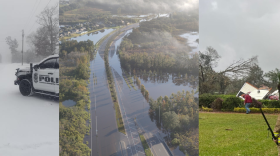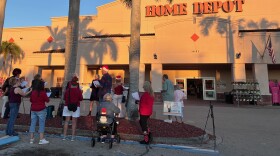A federal judge heard arguments Friday about whether he should block a key part of a new Florida property-insurance law, with a Hillsborough County construction company arguing that the measure violates First Amendment rights.
Gale Force Roofing and Restoration, LLC, filed a lawsuit last month challenging part of the law designed to prevent contractors from advertising to spur property owners to file roof-damage claims. The company contends the law violates speech rights, and its attorneys sought a preliminary injunction.
Chief U.S. District Judge Mark Walker held a hearing Friday on the injunction request but had not posted a ruling to the court docket as of 6:30 p.m.
Lawmakers passed the insurance measure (SB 76) on April 30 amid spiraling property-insurance rates and insurers dropping policies. The bill’s supporters and insurance-industry officials argued that questionable, if not fraudulent, roof-damage claims have played a big role in driving up costs.
The measure would prevent contractors from soliciting homeowners to file roof-damage claims through a “prohibited advertisement,” which could include such things as emails, door hangers, flyers and pamphlets.
In the lawsuit, Gale Force Roofing and Restoration said it advertises to homeowners to contact the company for inspections of storm damage to roofs.
“Plaintiff (Gale Force Roofing and Restoration) will then truthfully convey to homeowners the nature and extent of the damage,” the lawsuit said. “Plaintiff will then encourage homeowners to contact their insurance company to make a claim under their residential insurance policy and execute a contract with plaintiff to assign the benefits available under the homeowner’s insurance policy to plaintiff.”
The lawsuit said the company would be in violation of the new law, which took effect July 1. It also said the law is aimed at reducing the number of insurance claims filed, not at addressing fraud.
“The act is an unconscionable attack on the right for homeowners to receive truthful information about how to repair and pay for the repairs to remedy damage they may have to their property,” the company’s attorneys wrote. “In reality, it is a thinly veiled attempt to prevent anyone from assisting homeowners from making valid insurance claims to repair their homes.”
But in a court filing Wednesday, attorneys for state Department of Business and Professional Regulation Secretary Julie Brown --- the named defendant in the case --- disputed that the law’s restrictions violate First Amendment rights.
The filing said, for example, “targeted digital advertisements or e-mails, door hangers, or brochures handed out in person are prohibited if, and only if, they encourage a homeowner to make a roofing-insurance claim. Radio and television advertisements are allowed because they do not target ‘a specific person.’”
The filing also said Florida has a “compelling state interest” in making sure that homeowners are protected from skyrocketing insurance rates and have access to coverage. The document said fraud by contractors drives up costs.
“This translates into hundreds of dollars in increased premiums for some homeowners, and denial of coverage for others,” Brown’s attorneys wrote. “In Florida, this sort of fraud is particularly rampant given the concern over hurricane-driven roofing damage and the propensity for unscrupulous contractors to take advantage of homeowners who cannot readily assess whether their roofs need service. Plainly, the state’s interest in regulating this sort of commercial speech is substantial.”
Copyright 2021 WUSF Public Media - WUSF 89.7. To see more, visit WUSF Public Media - WUSF 89.7. 9(MDAyMTYyMTU5MDEyOTc4NzE4ODNmYWEwYQ004))







